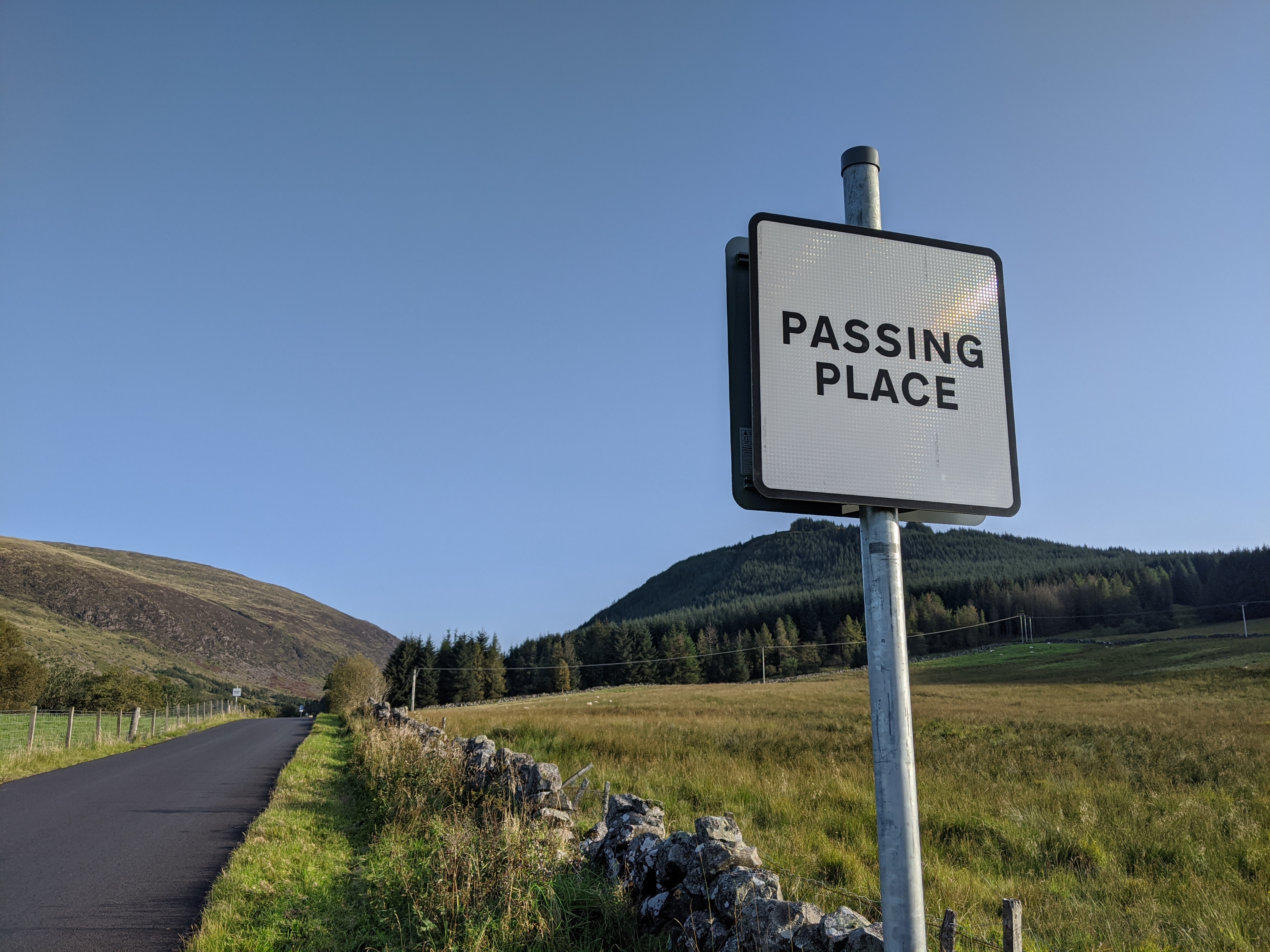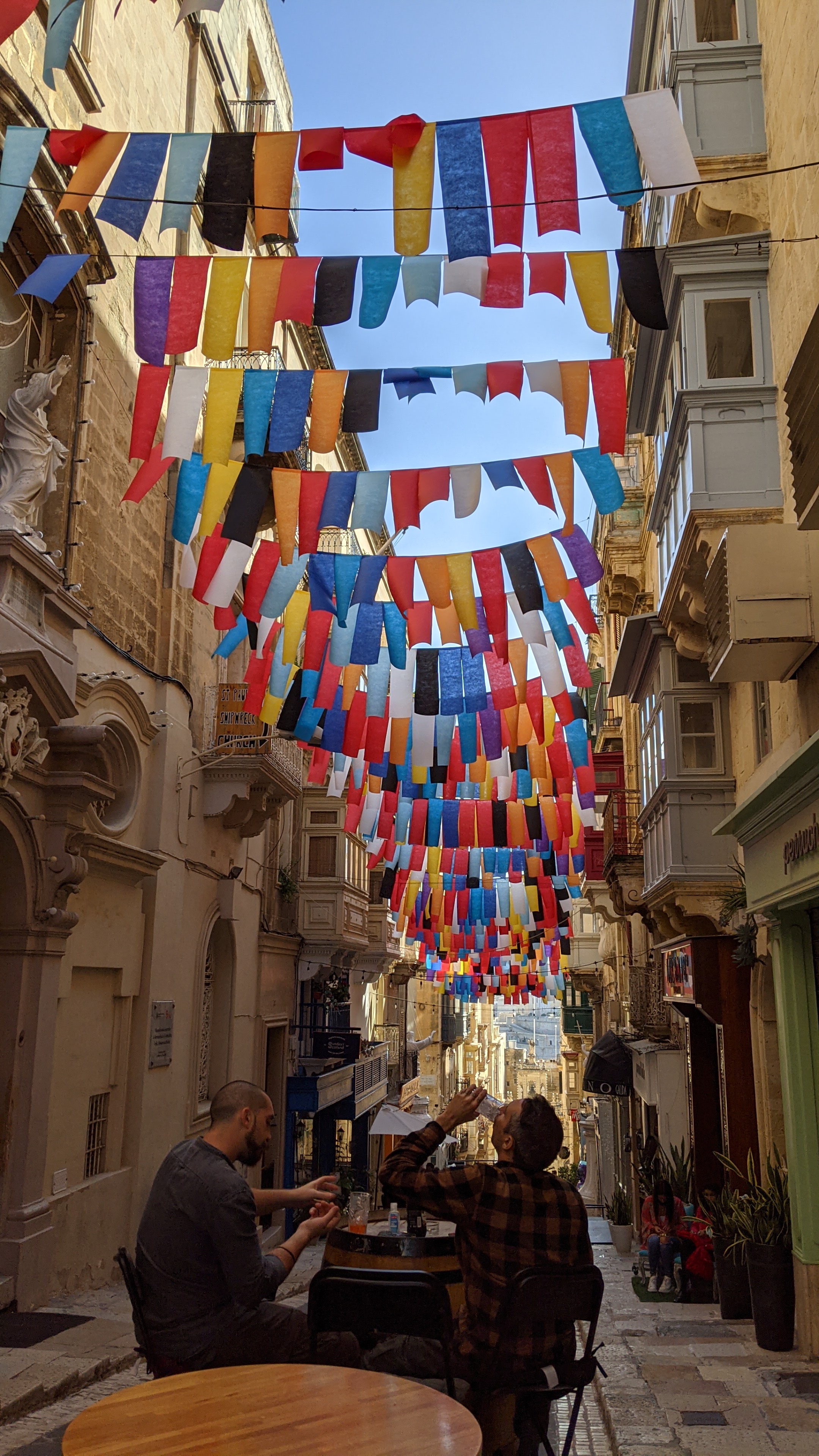Things we lost in lockdown
What I have understood from the myriad essays I've read about the perils of lockdown is that this period in time has helped many of us appreciate that, whilst we may be going through very similar things, our experiences of those things are wildly singular.
I spent many months of lockdown between boggy Scottish hills in a place that had everything going for it, except the element of warmth I'd come to expect (my parents had moved elsewhere, it was not their tread on the stair). My perceived failure to make the house and surrounding area work as well for me as it had my parents was punctured often by the frequent signposts in both directions along the narrow road joining the house to a small town a few miles away. Passing place. It was a place to pass the time. A shelter, an odd waiting room that the pandemic shunted us into whilst we hoped for freedoms we'd known to be reinstated.

In the way that landscapes can shape thoughts, the passing places became symbolic not just as a description of what I was doing in rural Scotland, but as a way to understand some of the mechanisms of loss. Loss that I'd suffered (and probably initiated) directly relating to lockdown. Not the concrete losses suffered by many - income, livelihood, solitude - but an altogether heartbreaking loss: friendship.
Imagine conversation is a road and a passing place is a sensitive topic. You move along this road, mostly with ease, largely in control of your velocity. You can see ahead, see those who are coming from a very different place. You navigate moments of encounter with those coming from a different direction by slowing down, making space - understanding that somethings can't be negotiated at your usual speed. They require more care. The space we instinctively create in these passing places have enormous value when engaging with those whose ideological bents are different to yours. Imagine then that some of your closest people are on the road alongside you, coming from a similar place, headed in a similar direction. Mostly, you'll breeze through the passing places barely noticing them. But now and then, you'll find yourself with much more space - a distance between you and your fellow travellers. And you'll wonder how the hell that happened. And you'll shake your head because you didn't see it coming. You had no idea this thing could be a point of contention.
=======
During this enfolded time, I learned for sure that another friendship, one I had found incredible solace in, had definitively come to an end. This was an act of self-preservation for my friend, who had the courage and foresight to understand that we make choices all the time about how we conduct ourselves and the 'being' we strive for - and that the shape of our friendship was not conducive to his overall peace and betterment. It was a hard thing to learn, but ultimately I admire the strength of his convictions and his efforts to build the life he needs. We were in each other's lives at important times, and that cannot be undone.
It is not, and nor will it be, the only time I've reflected on endings. I have been in a mode of salvaging - when people that care about me have seen my life as wreckage and disaster, I have claimed learning and discovery. I think one of the reasons books are much more potent to me than film or TV is that endings in books are far more likely to be nuanced, complex, gradual and ambiguous, as they are in reality.
There are many things I could point to that came from the alchemy of this friendship - today I think about the way he described me as the 'perfect reader'. What he observed in me was a willingness - perhaps even a pathological need - to give myself over to a book. It is a propensity that I have been proud of and fiercely guarded (it may be why I rarely read before bed - my capacity to be transported and active is limited). I have recently started to see a darker side to this way of being - a darkness that also infects the way I engage with people.
As the consistently brilliant Margaret Atwood writes:
"You'd be surprised how quickly the mind goes soggy in the absence of other people. One person alone is not a full person: we exist in relation to others."
My own relation to others acts orbitally, revolving around a central focal point (or many). Like the moon, it's necessary for me to have moments of invisibility, to be hidden and then come back into view. But when the gravitational pull of a person, my people, is gone, the feeling is aimlessness, an endless inertia in the black. I have spent so much of my life with a planet to relate to. Rewriting that orbital path is a colossal task.
=======
As is likely the case for many of us, this year has presented joyful developments as well as losses and infringements. The Scottish house now has a worthy inhabitant - a woman who has Scottish ancestry, has made friends with the neighbours and their horses, manages to skirt the bogs with grace and takes pleasure in the patience of firelighting. It's a match that is a delight to behold.

I've been fortunate enough to explore a new place - leaving Scotland in that small window of time before new waves of restrictions came into force. Malta is a source of much novelty - a language that, try as I might, I cannot hear as anything other than fighting; a rich history interwoven with ornate architecture; and gozitan cheese - tiny rounds of matured cheese, rolled in herbs and spices.
I have also experienced the deepening and broadening of a friendship that started in the maelstrom of my departure from New York. This friendship has blossomed perhaps because of the time shift, an embrace of asynchronicity. Long voice notes have been shared, walks have been taken 'together' and recently we've shifted to sharing things not easily contained by words - the sounds of a storm, music being played on piano. We've made a collective space that defies definition, that shifts and changes alongside our moods and the tilt of the world. How this is possible is a mystery to me - perhaps it depends upon there having been no normal (we've inhabited the same city for only brief periods of time) - or perhaps it is a mark of a disinclination to cement expectations. However it came to be, it is a generous and trusting bond. This friendship has also involved (and transcended) pursuits like listening out for silence. Silence, we're coming to appreciate, is simultaneously elusive and imbued with a range of textures and hues that Joseph's dreamcoat would envy. Recently we have explored how to survive, and whether it's possible to flourish, in such constrained situations.
We are aware of edges. We contrive them. In making homes, we put a frame around our epicentres for rest and rejuvenation. We are aware of these edges every time we return home, take a load off, change gear. The pandemic has forced a new awareness of these edges - turned them inside out in some cases. The frame has to contain more - our selves-at rest, selves-in-love, selves-expressing, selves-of-industry, work-it-out-selves, selves-absorbing, selves-reflecting, selves-projecting. A person, I think, expands outward - into the spaces they make, and beyond: over the threshold, and on, yonder. Then they contract, wend their way home, come to rest and regroup. The expansion and contraction of the person, the self, is a metaphorical breathing. If 'we exist in relation to others' there is, by necessity an I and a you, a me and a them. In order to clearly see those distinct entities, we need perspective and perspective itself relies upon movement so that scale and distance can be understood.
This edge-awareness and edge-construction, my friend suggests, is likely what is so alluring to both of us about the physical letter. Arriving in an envelope, the letter is framed, contained. And until opened, this envelope hosts a world of possibility. A promise.
Wishing space to roam and promises of the unknown to you all, Bxx